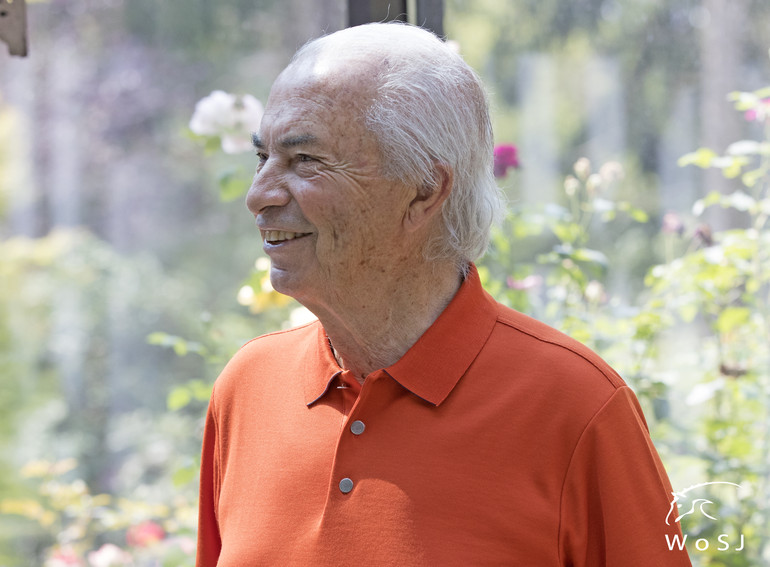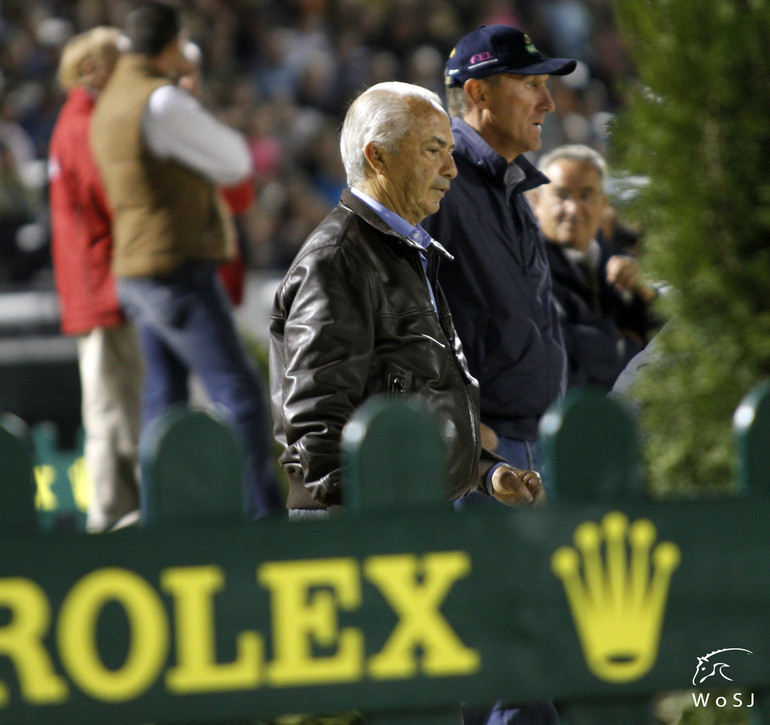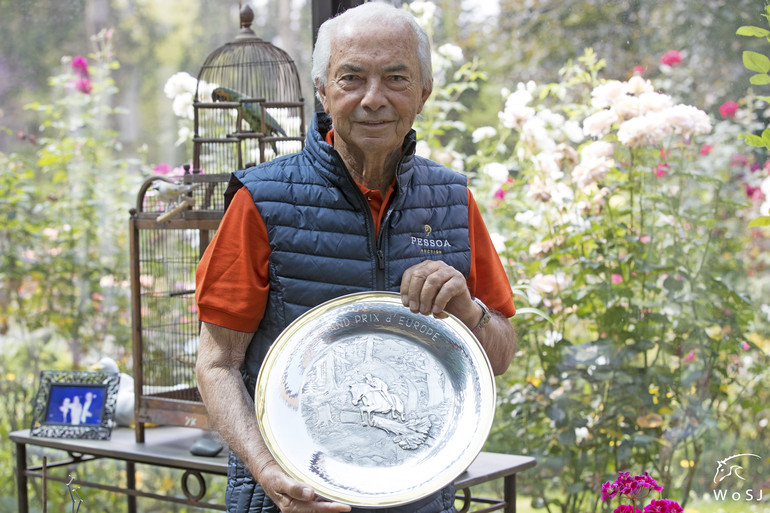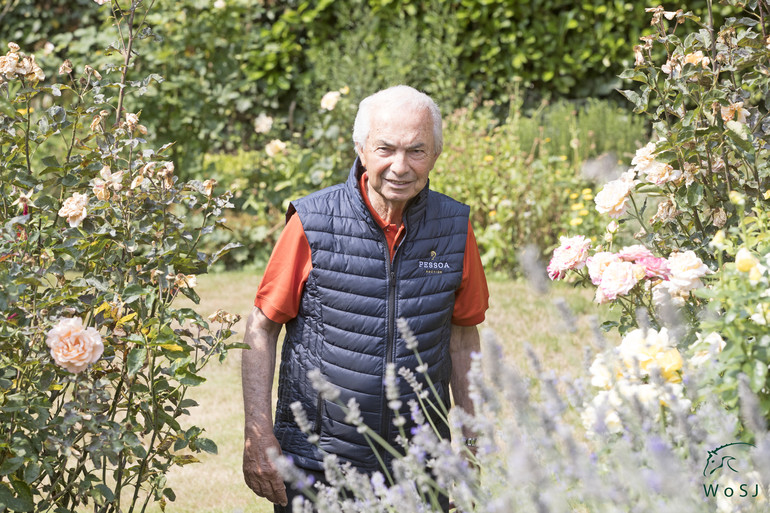Text © World of Showjumping
He’s soon 85 but shows no signs of slowing down. In August, he launched the Pessoa Auction and when this project reached its conclusion back in September there were other ones waiting. After somewhat reluctantly finding new homes for his beloved horses, Nelson ‘Neco’ Pessoa is ready to turn his full attention to coaching – with plans of innovative ways to make sure his legacy lives on. With the Olympic Games in Tokyo also on his agenda for 2021, as High-Performance Jumping Coach for the Australian eventing team, there is very little in Neco’s life suggesting that he is approaching his mid-eighties.
Divided over three chapters, Neco – also known as The Wizard – takes us with on his life journey and shares his experiences from an equestrian adventure that began just after World War II and which continues to this day.
If you missed chapter one or two, click here.
On the other side of the in-gate
When Neco decided to retire after the World Equestrian Games in Rome in 1998, Rodrigo had already taken over the reins on several of his former horses. “Rodrigo’s talent already started to shine through when he was 10,” Neco tells. “From there on, it was also a priority to help and push him. In 1992, when Rodrigo was 19, we competed together at the Olympic Games in Barcelona. Rodrigo with Special Envoy, I with Vivaldi. Then, in 1996, in Atlanta, Rodrigo and Tomboy helped Brazil to the team bronze medal. Two years later, Rodrigo became World Champion in Rome with Lianos while I did my last World Equestrian Games to finish 11th with Baloubet – I was 62 at the time. My focus had already shifted however, and now I was more often on the other side of the in-gate. Retiring was never difficult for me though, I had done enough and over so many years,” Neco tells. “I was a bit tired of competing, and when it came to my own career I was not so motivated anymore. Instead, Rodrigo’s success inspired me and made me very proud.”
“I spent more and more time on training and had success with the Saudi Arabian team. At the Olympic Games in Sydney in 2000, Khaled Al-Eid won the individual bronze. Then there was of course all of Rodrigo’s titles. In 2000, I opened the doors to Haras de Ligny where I welcomed several students from all corners of the world until I sold it in 2013. These days, I have been keeping my horses at Haras de Wisbecq while I live with my wife in our house in Brussels – our home for the last 35 years. Rodrigo is based in the US.”
“I have lived a beautiful life; I am 84 and still active,” Neco says. “However, I can feel that I am getting older. For example, I can be a bit stiff and tired in the mornings but when I take my hot shower I’m good for the day. In the evening, I move like an old horse though,” Neco laughs. “I can’t sit still for too long, then afterwards I cannot move anymore. What’s good is that I have something that interests me in my life, one day I am at a show coaching until late in the evening while the next day I am up early running after the young horses to see them free jump. I think that what has kept me in the game is that I surrounded myself with good people my entire life, I made friends all over the world. I like to be around dynamic personalities and the younger generation.”
Past, present, future
Much has changed since Neco started up his career in the 1950s. “I remember when I was 15, and my father was eager that I would make it as Rider of the Year in Brazil. I needed a couple of more points still, and the last competition of the season was a high-jumping championship. I finished with jumping 2.05m with my horse Urutau, he was super. Then my dad told me I had to try for the national record of 2.17 but I protested to that!” Neco smiles.
“At that time, riders had to have a minimum weight – for men it was 75 kg, women had to be 70 kg – can you believe it? Some of the girls had to put 20 kgs on to the back of the horse somehow, myself 10 kg. Kathy Kushner, a friend of mine, introduced me to more advanced techniques from America where Hermès was making saddles with mercury inside. Then you did not have to attach weights to the girth,” Neco laughs.
“As I told you, back when I was younger, it was a lot of focus on style and I still think this is very important,” Neco says. “In the US, the majority of the riders have style – no matter if they are good or bad – because it was instilled in them through the equitation and hunters. The American system is a great way of developing correct riding. In Europe, good style is less common. Here it’s more about who crosses the finish line first, with kids going full speed from an early age. It’s more acrobatics than riding,” Neco shrugs.
“I also don’t like to see young horses speeding around. If any of my riders came home with a ribbon for one of my 6- or 7-year-olds, I would fire them!” Neco laughs. “In my opinion, the years between four and seven should be about education, not about winning. I also prefer not to compete the horses until they are six, and then only sparingly. My philosophy is that every jump a horse makes is one less. Jumping the horses less when they are young makes them last longer.”
“While the quality of the sport is getting higher, which I appreciate, there are also certain aspects I worry about,” Neco says. “Today, money interferes a lot with the sport and that’s something I dislike. On the other hand, I do understand that it is necessary and it’s perhaps something we can’t really change. In my opinion, opportunities should be given to those that are talented more than to those that are fortunate. The FEI needs to ensure that new names can come through, they should fight for talent. With the system we have now it is easy that it’s the same group showing at the higher level, week in and week out, while those under them on the ranking don’t get the chance and will stay rank 200 or 300 for years. I don’t know the solution to the problem, but there are people that are paid to find the answers – it’s their job.”
“I think what we are witnessing at the moment is extreme at either end of the scale,” Neco says about showjumping in pandemic times. “Either you go to shows with 1000 horses and nothing to win, or you are either a top ranked rider or a multi-millionaire that can go to higher-level shows where the latter pays 100,000 Euro to jump for two weeks. In the first category, everyone wants to jump and sometimes the venues are filled up with 1000 horses even if there is no capacity for that. They end up starting at 8 AM in the morning and finish at 10 PM in the evening. The few exclusive shows are for the top ranked riders and the very wealthy people. While the FEI tries to keep the pay-cards under control, there is also the feeling that they give up a bit.”
As to his own fame and fortune, Neco has never let that define him. “I never had any interest to add importance to myself, I was raised to be modest and I have tried to live up to that,” Neco says. “I am most of all an observing type, my father taught me that it’s a great way of learning. Still, if I go to a show, I will look at all the riders and take mental notes of what I like and dislike – what to do and what not to do.”
“What I have appreciated the most in my life is to be recognised as a good horseman,” Neco says. “For me it’s been important to set a good example, and through teaching I have been able to give back to the sport that I love. I am really proud of all the students I developed over the years. Passing on my experience to the next generation, that’s been something I have truly enjoyed."
The end
No reproduction withouth permission, copyright © World of Showjumping












